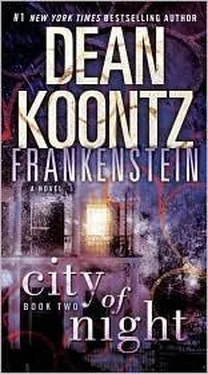She rapped again, with the same effect. When she rapped three times in succession, three concentric blue rings appeared, receded, faded.
Although her knuckle had made only the briefest contact, the glass had seemed cold. When she flattened her palm against it, she discovered that it was icy, though a few degrees too warm for her skin to freeze to it.
When she knelt on the Persian carpet and peered under the case, between its exquisitely sculpted ball-in-claw feet, she could see electrical conduits and pipes of various colors and diameters that came out of the bottom and disappeared into the floor. This suggested that a service room must lie below, although the mansion supposedly had no basement.
Victor owned one of the largest properties in the neighborhood and in fact had combined two great houses so elegantly that he had earned plaudits from historical preservationists. All of the interior reconstruction had been undertaken by members of the New Race, but not all of it had been disclosed to — or permitted by — the city’s building department.
Her brilliant husband had achieved more than entire universities of scientists. His accomplishments were even more remarkable when you considered that he had been forced to do his work clandestinely and since the regrettable death of Mao Tse-tung, without grants from any government.
She got to her feet and circled the case once more, trying to determine if there was a head or foot to it, as there would be to any bed or casket. The design of the object offered her no clue, but she at last decided, sheerly by intuition, that the head of it must be the end farthest from the door to the room.
Bending forward, bending low and lower, Erika put her face close to the top of the case, peering intently into the amber miasma, close and then closer, hoping for at least a faint suggestion of contour or texture to the shadowy shape within the liquid shroud.
When her lips were no more than two inches from the glass, she said softly, “Hello, hello, hello in there.”
This time it definitely moved.
Dog-nose Nick stood on the rim of the pit, breathing deeply of the stink brought to him by a light breeze that came down out of the declining sun.
More than an hour ago, the last of the day’s incoming trucks had dumped its load, and Crosswoods Waste Management had closed its gates until dawn. Now it was its own world, a universe encircled by chain-link topped with razor wire.
In the night ahead, the members of Nick Frigg’s crew were free to be who they were, what they were. They could do what they wanted, without concern that an Old Race truck driver might see behavior that belied their pose of sanitation-worker normality.
Down in the west pit below him, crew members were wedging pole-mounted torches into the trash field in the area where the interments would take place. After nightfall, they would light the oil lamp at the top of each pole.
With their enhanced vision, Nick and his people didn’t need as much light as they were providing, but for these ceremonies, torches set the perfect mood. Even those of the New Race, even Gammas like Nick, and even lowly Epsilons like the crew he bossed, could thrill to stagecraft.
Perhaps especially the Epsilons. They were more intelligent than animals, of course, but in some ways they were like animals in their simplicity and excitability.
Sometimes it seemed to Nick Frigg that the longer these Epsilons lived here in Crosswoods, having little contact with any Gamma other than he himself, having no contact at all with Betas or Alphas, the more simpleminded and more animalistic they became, as though without higher classes of the New Race to serve as examples, they could not entirely hold fast to even the meager knowledge and modest standards of deportment that had been downloaded into their brains while they had been in their tanks.
After the interments, the crew would feast, drink very much, and have sex. They would eat hungrily at the start, and soon they would be tearing at their food, gorging with abandon. The liquor would flow directly from bottle to mouth, mixed with nothing, undiluted, to maximize and accelerate its effect. The sex would be eager and selfish, then insistent and angry, then savage, no desire unindulged, no sensation unexperienced.
They would find relief from loneliness, meaninglessness. But the relief came only during the feeding, during the drinking and the sex. After, the anguish would return like a hammer, driving the nail deeper, deeper, deeper. Which they always forgot. Because they needed to forget.
At this moment, Gunny Alecto and other crewmen were at the walk-in cooler, loading the five human bodies and three dead gone-wrongs onto a pair of small, open-bed, four-wheel-drive trucks that would convey them to the site of the ceremony. The Old Race cadavers would be on one truck, the gone-wrongs on another.
The Old Race dead would be transported with less respect than gone-wrongs received, in fact with no respect at all. Their bodies would be subjected to grotesque indignities.
In the class structure of the New Race, the Epsilons had no one to whom they could feel superior — except those of the Old Race. And in these interment ceremonies, they expressed a hatred of such purity and such long-simmering reduction that no one in the history of the earth had ever despised more intensely, loathed more ferociously, or abominated their enemy with greater fury.
Some fun tonight.
At the Hands of Mercy, none of the three isolation rooms had been designed to contain a deadly disease, for Victor did not have an interest in the engineering of microorganisms. There was no danger whatsoever that he would accidentally create a deadly new virus or bacterium.
Consequently, the twenty-by-fifteen-foot chamber that he chose for Werner was not surrounded by a positive-pressure envelope to prevent the escape of airborne microbes and spoors. Neither did it have its own self-contained ventilation system.
The isolation room had been meant solely to contain any New Race variant — he experimented with some exotic ones — that Victor suspected might prove difficult to manage and any that unexpectedly exhibited antisocial behavior of a lethal nature.
Therefore, the walls, ceiling, and floor of the chamber were of poured-in-place, steel-reinforced concrete to a thickness of eighteen inches. The interior surfaces had been paneled with three overlapping layers of quarter-inch steel plate.
If necessary, a killing electrical charge could be introduced into those steel plates with the flip of the switch in the adjoining monitor room.
Sole access to the isolation chamber was through a transition module between it and the monitor room.
The staff sometimes referred to it as the air lock, although this inaccurate term annoyed Victor. No atmosphere changes occurred during the use of the transition module, and there was not even a simple recycling of air.
The module featured two round steel doors that had been made for bank vaults. By design, it was mechanically impossible to have both doors open at the same time; therefore, when the inner door opened, a prisoner of the isolation chamber might get into the vestibule, but it could not break through into the monitor room.
On a gurney, his flesh undergoing cellular breakdown if not even molecular reorganization, Werner had been rushed through the halls of Mercy, into the monitor room, through the module, into the isolation chamber, with Victor urging the attendants to “hurry, faster, damn you, run! ”
The staff might have thought that blind panic had seized their maker, but Victor couldn’t concern himself with what they thought. Werner had been secured in that fortresslike cell, which was all that mattered.
Читать дальше












